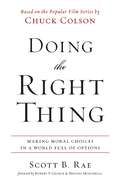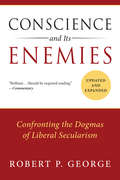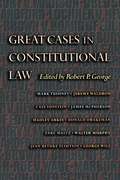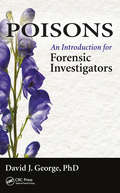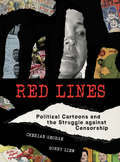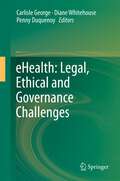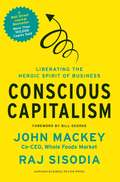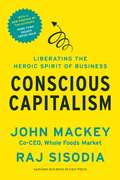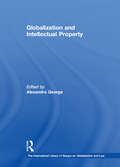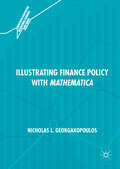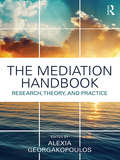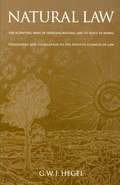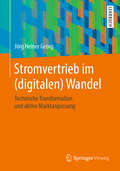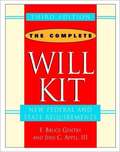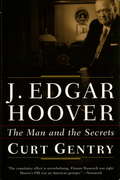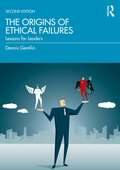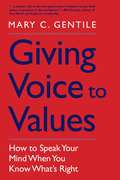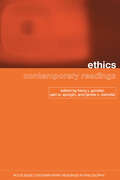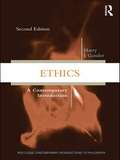- Table View
- List View
Doing the Right Thing: Making Moral Choices in a World Full of Options
by Robert P. George Melissa Moschella Scott RaeAccording to author Scott B. Rae in Doing the Right Thing, our culture is in an ethical mess because we’ve neglected moral training and education. This book proposes that there is such a thing as moral truth, that it can be known, and that it can be put into practice. Looking specifically at the areas of medicine, the marketplace, public life, education, and the family, Rae shows how foundational ethical principles can guide you in making moral day-to-day decisions. Informed by Scripture and calling for a renewed understanding of the importance of the Christian faith in moral training, Doing the Right Thing issues a call for cultivated virtue that can bring about both better lives and a better society. You will find yourself examining the ways in which ethical and character issues relate to your life. As a result, you will be better equipped to promote virtue in your own spheres of influence and the culture at large.
Conscience and Its Enemies: Confronting the Dogmas of Liberal Secularism
by Robert P. George"Many in elite circles yield to the temptation to believe that anyone who disagrees with them is a bigot or a religious fundamentalist. Reason and science, they confidently believe, are on their side. With this book, I aim to expose the emptiness of that belief." From the introduction: Assaults on religious liberty and traditional morality are growing fiercer. Here, at last, is the counterattack. Showcasing the talents that have made him one of America's most acclaimed and influential thinkers, Robert P. George explodes the myth that the secular elite represents the voice of reason. In fact, George shows, it is on the elite side of the cultural divide where the prevailing views frequently are nothing but articles of faith. Conscience and Its Enemies reveals the bankruptcy of these too often smugly held orthodoxies while presenting powerfully reasoned arguments for classical virtues.
Great Cases in Constitutional Law
by Robert P. GeorgeSlavery, segregation, abortion, workers' rights, the power of the courts. These issues have been at the heart of the greatest constitutional controversies in American history. And in this concise and thought-provoking volume, some of today's most distinguished legal scholars and commentators explain for a general audience how five landmark Supreme Court cases centered on those controversies shaped the country's destiny and continue to affect us even now. The book is a profound exploration of the Supreme Court's importance to America's social and political life. It is also, as many of the contributors show, an intriguing reflection of what some have seen as an important trend in legal scholarship away from an uncritical belief in the essentially benign nature of judicial power. Robert George opens with an illuminating survey of the themes that unite and divide the five cases. Other contributors then examine each case in detail through a lively commentary-and-response format. Mark Tushnet and Jeremy Waldron exchange views on Marbury v. Madison, the pivotal 1803 case that established the power of the courts to invalidate legislation. Cass Sunstein and James McPherson discuss Dred Scott v. Sandford (1857), the notorious case that confirmed the rights of slaveowners, declared that black people could not be American citizens, and is often seen as a cause of the Civil War. Hadley Arkes and Donald Drakeman explore the legacy of Lochner v. New York (1905), a case that ushered in decades of judicial hostility to social welfare laws. Earl Maltz and Walter Murphy assess Brown v. Topeka Board of Education (1954), the famous case that ended racial segregation in public schools. Finally, Jean Bethke Elshtain and George Will tackle Roe v. Wade (1973), still a flashpoint a quarter of a century later in the debate over abortion. While some of the contributors show sympathy for strong judicial interventions on social issues, many across the ideological spectrum are sharply critical of judicial activism. A compelling introduction to the greatest cases in U.S. constitutional law, this is also an enlightening glimpse of the state of the art in American legal scholarship.
Prisoner Voices from Death Row: Indian Experiences
by Reena Mary GeorgeDeath penalty has produced endless discourses not only in the context of prisons, prisoners and punishment but also in various legal aspects concerning the validity of death penalty, the right to life, and torture. Death penalty is embedded in Indian law, however very little is known about the people who are on death row barring a few media reports on them. The main objective of this book is to enquire whether the dignity of prisoners is upheld while they confront the criminal justice system and whilst surviving on death row. Additionally, it explores the lived-experiences and perceptions of prisoners on death row as they create meaning out of their world. With this rationale, 111 prisoners on death row in India and some of their family members were interviewed. The theoretical underpinnings of phenomenology and symbolic interactionism coupled with data analysis lead to an understanding of the prisoners on death row with special reference to their demographic profile and the impact of death sentence on their families. George’s research highlights three salient features, namely: poverty, social exclusion and marginalisation are antecedent to death penalty; death penalty is a constructed account by the state machinery; and prisoners on death row situate dignity higher in the juxtaposition of death and dignity.
Alcatraz (Cornerstones of Freedom)
by Linda GeorgeRelates the history of the notorious prison in San Francisco Bay, tells about its most infamous inmates, and describes its present-day status as part of the Golden Gate Recreation Area.
Poisons: An Introduction for Forensic Investigators
by David J. GeorgeA unique book on recognition and investigation of criminal poisoning for investigators of all backgrounds and stages of their careers. Poisons: An Introduction for Forensic Investigators is a concise yet comprehensive overview of toxicants and unanticipated circumstances in which poisoning occurs. This book expands awareness of poisoning possibilities, heightens recognition of the toxic potential of many substances, and provides information to aid in focusing investigations. Poisons discusses life-threatening toxic substances and agents that modify behavior to achieve criminal goals. These include drugs that facilitate sexual assaults and robberies, and those found in medical child abuse and drug-product tampering. More than 230 case studies illustrate both unintentional and intentional poisoning and highlight situations where poisoning may not immediately be apparent. Information is included in pertinent criminal poisoning cases to illustrate the temperament of poisoners, their relationship to victims, their basis for poison selection, and their method of administration. Since Poisons is written by a single author, the discussions, format, educational level, and terminology remain consistent to aid crime scene investigators, homicide detectives, forensic scientists, death investigators, toxicologists, medical examiners, attorneys, and students. The book's more than 650 references are an asset to frame knowledge as well as a resource to return to again and again.
Red Lines: Political Cartoons and the Struggle against Censorship (Information Policy)
by Cherian George Sonny LiewA lively graphic narrative reports on censorship of political cartoons around the world, featuring interviews with censored cartoonists from Pittsburgh to Beijing.Why do the powerful feel so threatened by political cartoons? Cartoons don't tell secrets or move markets. Yet, as Cherian George and Sonny Liew show us in Red Lines, cartoonists have been harassed, trolled, sued, fired, jailed, attacked, and assassinated for their insolence. The robustness of political cartooning--one of the most elemental forms of political speech--says something about the health of democracy. In a lively graphic narrative--illustrated by Liew, himself a prize-winning cartoonist--Red Lines crisscrosses the globe to feel the pulse of a vocation under attack.A Syrian cartoonist insults the president and has his hands broken by goons. An Indian cartoonist stands up to misogyny and receives rape threats. An Israeli artist finds his antiracist works censored by social media algorithms. And the New York Times, caught in the crossfire of the culture wars, decides to stop publishing editorial cartoons completely. Red Lines studies thin-skinned tyrants, the invisible hand of market censorship, and demands in the name of social justice to rein in the right to offend. It includes interviews with more than sixty cartoonists and insights from art historians, legal scholars, and political scientists--all presented in graphic form. This engaging account makes it clear that cartoon censorship doesn't just matter to cartoonists and their fans. When the red lines are misapplied, all citizens are potential victims.
eHealth: Legal, Ethical and Governance Challenges
by Carlisle George Diane Whitehouse Penny DuquenoyThis publication identifies and discusses important challenges affecting eHealth in the EU and North America in the three areas of law, ethics and governance. It makes meaningful contributions to the eHealth discourse by suggesting solutions and making recommendations for good practice and potential ways forward. Legal challenges discussed include issues related to electronic medical records, telemedicine, the Internet and pharmaceutical drugs, healthcare information systems and medical liability. Ethical challenges focus on telehealth and service delivery in the home, Web 2.0 and the Internet, patient perceptions and ethical frameworks. Governance challenges focus on IT governance in healthcare, governance and decision-making in acute care hospitals, and different models of eHealth governance. The publication provides useful support materials and readings for persons active in developing current understandings of the legal, ethical and governance challenges involved in the eHealth context.
Conscious Capitalism
by Bill George Rajendra Sisodia John MackeyAs seen on Oprah's Super Soul SundayA New York Times and Wall Street Journal BestsellerIn this book, Whole Foods Market cofounder John Mackey and professor and Conscious Capitalism, Inc. cofounder Raj Sisodia argue for the inherent good of both business and capitalism. Featuring some of today's best-known companies, they illustrate how these two forces can-and do-work most powerfully to create value for all stakeholders: including customers, employees, suppliers, investors, society, and the environment.These "Conscious Capitalism" companies include Whole Foods Market, Southwest Airlines, Costco, Google, Patagonia, The Container Store, UPS, and dozens of others. We know them; we buy their products or use their services. Now it's time to better understand how these organizations use four specific tenets-higher purpose, stakeholder integration, conscious leadership, and conscious culture and management-to build strong businesses and help advance capitalism further toward realizing its highest potential.As leaders of the Conscious Capitalism movement, Mackey and Sisodia argue that aspiring leaders and business builders need to continue on this path of transformation-for the good of both business and society as a whole.At once a bold defense and reimagining of capitalism and a blueprint for a new system for doing business grounded in a more evolved ethical consciousness, this book provides a new lens for individuals and companies looking to build a more cooperative, humane, and positive future.
Conscious Capitalism, With a New Preface by the Authors
by Bill George Rajendra Sisodia John MackeyAs seen on Oprah's Super Soul SundayThe bestselling book, now with a new preface by the authorsAt once a bold defense and reimagining of capitalism and a blueprint for a new system for doing business, Conscious Capitalism is for anyone hoping to build a more cooperative, humane, and positive future.Whole Foods Market cofounder John Mackey and professor and Conscious Capitalism, Inc. cofounder Raj Sisodia argue that both business and capitalism are inherently good, and they use some of today's best-known and most successful companies to illustrate their point. From Southwest Airlines, UPS, and Tata to Costco, Panera, Google, the Container Store, and Amazon, today's organizations are creating value for all stakeholders-including customers, employees, suppliers, investors, society, and the environment.Read this book and you'll better understand how four specific tenets-higher purpose, stakeholder integration, conscious leadership, and conscious culture and management-can help build strong businesses, move capitalism closer to its highest potential, and foster a more positive environment for all of us.
Constructing Intellectual Property
by Alexandra GeorgeWhat is 'intellectual property'? This book examines the way in which this important area of law is constructed by the legal system. It argues that intellectual property is a body of rules, created by the legal system, that regulate the documented forms of abstract objects, which are also defined into existence by the legal system. Intellectual property law thus constructs its own objects of regulation and it does so through the application of a collection of core concepts. By analyzing the metaphysical structure of intellectual property law and the concepts the legal system uses to construct 'intellectual property', the book sheds new light on the nature of this fascinating area of law. It explains anomalies between social and intellectual property uses of concepts such as authorship - here dubbed 'creatorship' - and originality and it helps to explain the role of intellectual property from a structural (rather than the traditional normative) perspective.
Globalization and Intellectual Property (The International Library of Essays on Globalization and Law)
by Alexandra GeorgeIntellectual property laws have become intricately entwined with discussions about globalization. This volume deals with the politics, economics and effects of global intellectual propertization. It provides essays covering key issues including the international relations of global intellectual propertization, the TRIPS Agreement and the tying of intellectual property issues to international trade negotiations, contentions that global intellectual propertization is a form of post-colonial neo-imperialism, globalization's effects on intellectual property law's classic doctrines and rationales and the cultural effects of global intellectual propertization.
Illustrating Finance Policy with Mathematica (Quantitative Perspectives On Behavioral Economics And Finance Ser.)
by Nicholas L. GeorgakopoulosStudents in various disciplines—from law and government to business and health policy—need to understand several quantitative aspects of finance (such as the capital asset pricing model or financial options) and policy analysis (e.g., assessing the weight of probabilistic evidence) but often have little quantitative background. This book illustrates those phenomena and explains how to illustrate them using the powerful visuals that computing can produce. Of particular interest to graduate students and scholars in need of sharper quantitative methods, this book introduces the reader to Mathematica, enables readers to use Mathematica to produce their own illustrations, and places specific emphasis on finance and policy as well as the foundations of probability theory.
The Mediation Handbook: Research, theory, and practice
by Alexia GeorgakopoulosThe Handbook of Mediation gathers leading experts across fields related to peace, justice, human rights, and conflict resolution to explore ways that mediation can be applied to a range of spectrums, including new age settings, relationships, organizations, institutions, communities, environmental conflicts, and intercultural and international conflicts. The text is informed by cogent theory, state-of-the-art research, and best practices to provide the reader with a well-rounded understanding of mediation practice in contemporary times. Based on four signature themes—contexts; skills and competencies; applications; and recommendations—the handbook provides theoretical, applicable, and practical insight into a variety of key approaches to mediation. Authors consider modern conflict on a local and global scale, emphasizing the importance of identifying effective strategies, foundations, and methods to shape the nature of a mediation mindfully and effectively. With a variety of interdisciplinary perspectives, the text complements the development of the reader’s competencies and understanding of mediation in order to contribute to the advancement of the mediation field. With a conversational tone that will welcome readers, this comprehensive book is essential reading for students and professionals wanting to learn a wide range of potential interventions for conflict.
Natural Law
by Georg Wilhelm Friedrich Hegel H. B. Acton T. M. Knox John R. SilberOne of the central problems in the history of moral and political philosophy since antiquity has been to explain how human society and its civil institutions came into being. In attempting to solve this problem philosophers developed the idea of natural law, which for many centuries was used to describe the system of fundamental, rational principles presumed universally to govern human behavior in society. By the eighteenth century the doctrine of natural law had engendered the related doctrine of natural rights, which gained reinforcement most famously in the American and French revolutions. According to this view, human society arose through the association of individuals who might have chosen to live alone in scattered isolation and who, in coming together, were regarded as entering into a social contract.In this important early essay, first published in English in this definitive translation in 1975 and now returned to print, Hegel utterly rejects the notion that society is purposely formed by voluntary association. Indeed, he goes further than this, asserting in effect that the laws brought about in various countries in response to force, accident, and deliberation are far more fundamental than any law of nature supposed to be valid always and everywhere. In expounding his view Hegel not only dispenses with the empiricist explanations of Hobbes, Hume, and others but also, at the heart of this work, offers an extended critique of the so-called formalist positions of Kant and Fichte.
Stromvertrieb im (digitalen) Wandel: Technische Transformation und aktive Marktanpassung
by Jörg Heiner GeorgIn diesem Lehrbuch wird ein grundlegendes Verständnis für Geschäftsmodelle speziell im Stromvertrieb vermittelt und wesentliche Funktionen des Betriebsmodells (Aufbau- und Ablauforganisation) erklärt. Dabei hat der Autor auf auf Praxisbezug Wert gelegt und sowohl die Treiber der Digitalisierung als auch die Wirkungsmechanismen der Transformation sowie datengetriebene Geschäftsmodelle beschrieben. Architektur und systematischer Aufbau möglicher Geschäftsmodelle sind anhand von Teilmodellen nachvollziehbar dargestellt und veranschaulicht. Das Buch hilft Studierenden energietechnischer, energiewirtschaftlicher und angrenzender Fachbereiche aktuelle Modelle zu verstehen, zu analysieren und schafft damit die Grundvoraussetzung diese Kenntnisse im späteren Berufsleben einzusetzen.
In America's Court: How a Civil Lawyer Who Likes to Settle Stumbled into a Criminal Trial
by Thomas GeogheganA lawyer used to the civil courts finds himself in a criminal court where things are very different.
The Complete Will Kit (3rd edition)
by F. Bruce Gentry Jens C. Appel IIIA good overview on the subject of wills and estate planning. Includes some information on regulations and resources by state.
J. Edgar Hoover: The Man and the Secrets
by Curt Gentry"The cumulative effect is overwhelming. Eleanor Roosevelt was right: Hoover's FBI was an American gestapo."--Newsweek Shocking, grim, frightening, Curt Gentry's masterful portrait of America's top policeman is a unique political biography. From more than 300 interviews and over 100,000 pages of previously classified documents, Gentry reveals exactly how a paranoid director created the fraudulent myth of an invincible, incorruptible FBI. For almost fifty years, Hoover held virtually unchecked public power, manipulating every president from Franklin D. Roosevelt to Richard Nixon. He kept extensive blackmail files and used illegal wiretaps and hidden microphones to destroy anyone who opposed him. The book reveals how Hoover helped create McCarthyism, blackmailed the Kennedy brothers, and influenced the Supreme Court; how he retarded the civil rights movement and forged connections with mobsters; and what part he played in the investigations of President John F. Kennedy and Martin Luther King Jr.
The Origins of Ethical Failures: Lessons for Leaders
by Dennis GentilinIn this thoroughly updated new edition of his ground-breaking and award-winning book, Dennis Gentilin draws on both his personal experience as a well-known whistleblower and recent events in the Australian financial services industry to provide insights into how widespread, systemic ethical failure can take hold in an industry and, crucially, what leaders need to focus on to avoid it. In 2001, as a young university graduate, Dennis Gentilin became a member of an FX trading desk at one of Australia’s largest banks, the National Australia Bank. In the years that followed, the desk became involved in a trading scandal that resulted in the resignation of the chairman and CEO, the collapse of the board, significant financial loss and incalculable reputational damage. Over the past decade, the frequency of ethical failure within the Australian financial services industry has only increased. Among other failures, there have been multiple breaches of the Anti-Money Laundering and Counter-Terrorism Financing Act, rigging of the benchmark BBSW interest rate, mis-selling of consumer credit insurance and predatory sales practices. In this new edition, Gentilin draws on experimental research from economics and finance to illustrate how, when the conditions are permissive, humans have a predisposition towards dishonesty, and therefore, to reduce the likelihood of ethical failure, leaders must focus obsessively on putting in place appropriate institutional arrangements. Gentilin’s combination of intellectual rigour and real-life reflections makes this book a must-read for students, practitioners and leaders alike who would like to develop a deeper understanding of corporate ethics, governance and conduct.
Giving Voice to Values
by Mary C. GentileThis small volume presents directly applicable ideas and tasks that teach the reader how to feel empowered to speak up and persist in speaking up for what's right in the work place. Gentile (Babson College, Wellesley, Mass.) fashions the principles behind the concepts into a clear set of skills for action, with the belief that most people know the difference between right and wrong but are hindered for many reasons in speaking up in the workplace. Ethics, psychology, and philosophy are part of the text's content, but the main focus is on values and action, how to overcome fear of conflict, understand the motivation of others, look ahead to see risk, communicate with others, and generally feel empowered to act for what's right in the workplace. An appendix contains extensive study aids for the reader and materials for peer-coaching. Annotation ©2010 Book News, Inc. , Portland, OR (booknews.com)
Exile, Murder and Madness in Siberia, 1823–61
by Andrew A. GentesDespite reports of exile proving disastrous to the region, 300,000 Russian subjects, from political dissidents to the elderly and mentally disabled, were deported to Siberia from 1823-61. Their stories of physical and psychological suffering, heroism and personal resurrection, are recounted in this compelling history of tsarist Siberian exile.
Ethics: Contemporary Readings (Routledge Contemporary Readings in Philosophy)
by Harry J. Gensler Earl W. Spurgin James C. SwindalEthics: Contemporary Readings is designed to lead any student into the subject, through carefully selected classic and contemporary articles. The book includes articles by the leading figures in the field and provides an excellent entry to the topic. The book complements Harry Gensler's Ethics: A Contemporary Introduction (Routledge, 1998).
Cambridge Studies in Religion, Philosophy, and Society: Ethics and Religion
by Harry J. GenslerMany people question whether God is the source of morality. Under divine command theory, God's will creates the moral order, and therefore ethical truths are true because of God's will. Under natural law, on the other hand, some ethical truths do not depend on God's will, and yet perhaps they depend on his reason or creation. Ethics and Religion develops strong, defensible, and original versions of both divine command theory and natural law. The book also discusses ethics and atheism: how atheists object on ethical grounds to belief in God and how they view ethics. The book defends belief in God from criticisms and analyzes related concepts, such as practical reason, the golden rule, ethics and evolution, the problem of evil, and the fine-tuning argument.
Ethics: A Contemporary Introduction
by Harry J GenslerHarry Gensler's Ethics introduces undergraduates to the main issues in contemporary moral philosophy. It also relates these issues to practical controversies, with special attention paid to racism, moral education, and abortion. It gives a practical method for thinking about moral issues, a method based largely on the golden rule. Key Features:* Serves as either the sole textbook for a lower-level introduction to ethics/moral philosophy course or a supplementary text for a more advanced undergraduate ethics course* Provides clear, direct writing throughout, making each chapter easily accessible for an engaged undergraduate* Offers a philosophically rigorous presentation of the golden rule* Includes helpful study aids, including: bolded technical terms, boxes for key ideas, chapter summaries, suggested readings, and a glossary/index Key additions to the Second Edition:* A new chapter on virtue ethics, which deals with Aristotle, Plato, and related controversies* A new chapter on natural law theory, which deals with Aquinas, double effect, sexual morality, and related controversies* A significantly revised chapter on the golden rule, which is now much clearer on certain key points* A significantly revised chapter on nonconsequentialism, which now has expanded coverage of human rights, libertarianism, and socialism, and uses the right to health care as a case example* An expanded bibliography* A new appendix that overviews key books students will want to pursue upon completing Ethics: A Contemporary Introduction, Second Edition* A rewritten instructional program, EthiCola, which is now much easier to download and use and has (for students) revised exercises for each chapter and (for instructors) a score-processing program, class slides, and instructor's manual. This can be found on the book's companion website: http://www.routledge.com/textbooks/gensler.
